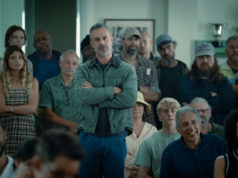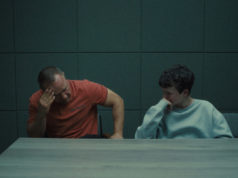AUSTRALIA (PG)
Bloated but charming and effective WWII-period piece by native Australian Baz Luhrmann (Romeo & Juliet, Moulin Rouge). Fellow Aussie and Luhrmann go-to gal Nicole Kidman stars as Lady Ashley, a.k.a. Mrs. Boss, the wife of a wannabe cattle baron who’s off in Oz running a withering ranch and doing whatever else wealthy men do when separated from their wives by a continent while she’s riding horses and bossing the help around back home in England. She’s brought to Australia by his grisly murder. To prevent the territory’s almost-monopoly from strong-arming her into selling, she hires a local badass/outcast drover named, well, The Drover (another native Australian, Hugh Jackman), who, when he’s not pouring water over his hairy, buff torso, helps bring her “fat, cheeky bulls” to market –– the neighborhood boys are going off to war and will need an ample supply of beef to see them through. (Remember, kids: Top sirloin is an important part of every battle!)
The almost-monopoly, though, is also angling for the government contract. In trying to derail Mrs. Boss and Wolverine, the baddies pull a bunch of stunts, all while threatening to send an orphan to whom the ragtag ranchers have grown fond to a nearby slave island/Christian mission. Nullah (Brandon Walters), the offspring of a white man and aboriginal woman, is “creamy,” meaning that he’s neither white nor aboriginal but half-caste. He also is the film’s cipher for all kinds of pedantry about our skewed, Western notions of culture and class.
As the dances-with-natives cattle driver, Jackman is imminently likable. As always. Other than maybe Brad Pitt, Jackman is the only Hollywood hunk I can think of who’s appreciated openly by everyday Joes, who typically introduce their fondness for the man by saying, “I’m not gay, but …” Kidman is as stunning as ever. Some people think that her face is stuffed with so much Botox that she can barely blink. I dunno. I sill think she’s the prettiest, most talented leading lady in Hollywood. In Australia, she pulls off everything, from deadly serious to deadpan, sultry to just about every emotional shade in between. She also gets big laughs, by playing either absolutely flustered or cool and calm when she clearly isn’t. When Mrs. Boss is advised to console the “creamy” kid after he’s suffered major trauma, she approaches his sobbing, curled-up personage and says, while wringing her hands, “Nullah, I wanted to extend my condolences … ” Angelina Jolie would have just bitten the kid’s head off.
The cinematography, like the yarn itself, is epic: lots of wide-angle shots of the outback and the port town of Dublin. The palette is all gunmetal grays, chocolates, and beiges, with bursts of fiery orange. Very painterly. And beautiful.
The movie certainly isn’t great, but it is the work of a director with a vision.
Look. I’m as arty-farty and “indie” as the next dirtball. I’m also a fanboy. I’d put my collection of Silver Age comics up against Kevin Smith’s any day. But I couldn’t endure 20 minutes of Let the Right One In, a critically lauded, arty-farty indie vampire flick from someplace cold. Sweden or wherever. The story is about a young female bloodsucker who, with an adult keeper (maybe her father), moves into an apartment next door to a woman and her son, who is bullied at school. The pacing is slllooowww, and not in a meditative, time-elapsed-camera kind of way, and the editing creates more confusion than clarity –– the exterior shots of the buildings where some of the “action” takes place are inconsistent, and there’s no visual connective tissue among the supporting players. How are you supposed to know that that guy at the bar is the same guy at the apartment when you never even get to see his face clearly and he keeps changing his damn clothes?! The child actors are bad enough to make you want to bite yourself.
Clive Owen and Naomi Watts star in this unnecessarily long thriller about an international bank that wants to start Third-World wars to profit from them. Or something. Except for a protracted shoot-out at the Guggenheim, most of the action here is people’s lips moving. As an Interpol agent trying to bring down the bank, Owen is his usual serious self, though I’m still not convinced he’s leading-man material –– he’s kind of dopey. When he walks, his knees bend in a little, and his feet point outward. Basically, if he wore his pants just an inch higher, you’d be obligated to give him a wedgie and a swirly (in that order). Watts, as a tough Manhattan DA, is totally creamy.
Two actresses who everyone thinks are hot but who do next to nothing for me, Scarlett Johansson and Penelope Cruz, star as two-thirds of a domestic ménage a trois that takes place in the present day in the titular Spanish city. The lucky guy is Javier Bardem, who’s reminiscent of an older, beefier Robert Downey Jr., all wall-eyed, sunken-eyed, and slightly pan-faced. Bardem, as visual artist/seduction artist Juan-Antonio, gets things started by propositioning Cristina (Johansson) and her friend Vicky (Rebecca Hall), who are in Spain together on summer vacation, at a fancy restaurant. Witty banter and panoramic shots of B-lona ensue.
The film is another male fantasia directed by famous pervert Woody Allen, who tries to redeem his lust for pretty young thangs here by introducing sheer mayhem into the plot –– Cruz’s Maria-Elena may or may not have tried to murder Juan-Antonio in the past, and Vicky agrees to marry the dorky Wall Street douchebag to whom she is engaged even though she’s in lust/love with Juan-Antonio.
Allen, per his m.o., is aiming for a Shakespearean farce but doesn’t generate enough laughs to qualify. The last chuckle comes early in the film, when Cristina responds to Juan-Antonio’s proposition by saying sweetly, with a twinkle in her eye, “I can’t guarantee any lovemaking because I happen to be very moody.”
To the director’s credit, however, he does raise some interesting questions about the nature of love and why we believe only two people can be in love with only each other and only at the right time. Plus, as one of the characters asks, can only unfulfilled love be romantic?
(And just in time for the sequel) TRANSFORMERS (PG-13)
Two words: Stu. Pid. Rent something else instead, please. Disco Beaver from Outer Space, perhaps. Or maybe Leprechaun: Back 2 tha Hood. Whatever you do, don’t contribute to the delinquency of Transformers director and overgrown child Michael Bay (Pearl Harbor, Armageddon, Bad Boys II), who treats explosions as tenderly as other directors treat characters and treats characters like just things to be exploded and is the very definition of the pejorative “hack.”
I’d just missed the toyline on which the cartoon series on which the movie is based –– the toys had the misfortune of coming out right around the time I’d discovered girls. I had a general idea about them, though. (The toys, of course. Not the girls. I still don’t know a damn thing about them.) Good and evil shape-changing alien robots, you say? What’s not to like?!
The movie, for one thing, which is just an excuse for Bay to blow shit up. Clearly, when he’s in the director’s chair, logic is wholly fungible. The early appearance of a scorpion ‘bot that battles U.S. forces for what feels like two hours is never explained. The friendly ‘bot Bumblebee loses his ability to speak –– even though he’s a freaking alien robot who can transform into a freaking car! And why is Megatron, the head of the bad robots, two times larger than every other ‘bot in one scene but about the same size as them in another?
But why ask why? As my wife said during viewing, “Why are you getting all logical about a movie about alien robots?!”
As for the plot: Guns. Guns. Guns. Explosions. Bullets. Bullets. Explosions. Explosions. Explosions. Bullets. Canons. Flamethrowers. Guns. Guns. Guns. Bullets. Bullets. Explosions. Explosions. Grenades. Explosions. Explosions. Explosions. Explosions. Explosions. Explosions.
As for the acting, Megan Fox effortlessly interrogates the psychological trauma that underpins new romance in a time of war, and … oh, who am I kidding. She’s just freakishly hot. Co-star Shia Labeof, though, is not only much less easy on the eyes but also supremely annoying. His nervous shtick gets real old, real fast. I wanted to like him. I really did. He has a nice face and does a good job of sinking into his role –– like a quality actor, his acting is “invisible,” as they say. But for every one witty thing that comes out of his stammering mouth, he utters 10 or 12 completely useless words and phrases. Such a delivery might work wonders in a Woody Allen movie but not in what you expect to be a fast-paced action flick.












I agree with IslamIslam100.
I’m assuming Islam’s comment was removed. Interesting that you didn’t find “Vicky Cristina” enjoyable just on a visual level, Anthony. Maybe Cruz and Johansson don’t do anything for you, but the cities of Barcelona and Oviedo look absolutely gorgeous. (The DVD transfer’s colors are a bit flatter than the ones in the movie on the big screen, but it still looks pretty good.) As for the rest of it, Woody didn’t really say much new, but at least he managed to say it without becoming tendentious like he sometimes does. Oh, and Bardem’s performance held the film together.
Regarding “Let the Right One In,” you’re dead wrong (or undead wrong, as the case may be). It’s true that the slow pace takes some getting used to, and this isn’t by any means a conventional horror flick. But if you checked out after 20 minutes, you haven’t seen this thing.
First, let me be clear: I’m not sure how much of the movie I actually watched. I checked out right around the time of the girl’s first attack. Could have been 20 minutes in. Could have been 60. The fact is that it felt like forever, and I didn’t want to sit through the rest because A.) life is short, and B.) the movie was painfully amateurish. Conventionality has nothing to do with my antipathy. (I like a lot of unconventional films.) The acting was bad, the editing was bad, the dialogue was horrendous. The film’s only redeeming quality, IMHO, was the folio work and sound editing, criteria that probably don’t top people’s lists of Reasons to See a Movie.
Only ’cause I respect your opinion, Kristian, I’ll give the flick another try. My expectations are so low, however, that any semblance of drama might qualify as a redeeming achievement.
As far as the dialogue goes, apparently the subtitles aren’t so good on the DVD transfer. They’re different from the ones used in the theatrical version, and they’ve flattened out the nuances in the Swedish dialogue to such an extent that the company that made them has actually received a flood of complaints. There’s even been talk of another DVD version that might come out just to correct the subtitles!
I’m glad you’ll be giving this another shot. Think of the movie as a romance (with some very disturbing undertones) instead of a horror flick, and it might work better for you.
Int’resting. Thanks, Kristian!
Anthony, gonna have to join Kristian in defending “Let the Right One In”. Not saying you’re wrong in not liking it, but I do think you should give it another shot on different merits as a weird relationship movie rather than a straight up horror flick. Its definitely a movie more about the kids relationship than being scary, though I thought it was pretty scary and disturbing. Although I do have to disagree with you about the directing and the acting, which to me were perfectly understated. Also I’m not sure how you can say the kids are bad actors. I thought they were great, very real, creepy and still somehow relatable (for me at least). Of course I dig weird people and unique relationships almost as much as giant monsters and dinosaurs.
Also Kristian yes the DVD did come with poorer subtitles than the one in theaters. A new DVD release is coming out with those better subtitles sometime soon.
Also, “Transformers”. I can’t really defend the quality of the movie (and I’m guessing a lot of people are going to doubt my critical abilities after I gave the sequel a pass, while even other geeks are hating it) and I won’t since I still have a lot of problems with it and the sequel. But I can explain a few things. 1) The big scorpion pops out of the helicopter-robot’s back dearly in the movie and digs into the sand which explains where he comes from during the desert battle. 2) Megatron appears the same size as some robots and bigger than others because he is. The robot that he snaps in half, Jazz, is smaller than he is. Optimus Prime who he fights is about the same size as him. You can tell in plenty of scenes when all the Autobots are together that they’re different sizes (well, you can mostly tell; thanks Bay for using shakey cam to obscure great special effects).
Also I always find it funny when people say not to take a movie seriously like you said Dana did because its about something like alien robots. I’m sure part of that is my own skewed priorities (I’ll take a Godzilla movie much more seriously than something like say “Rachel Getting Married” or “Lost in Translation”). I know I made my case for source material in my review of the sequel but I think anything can be taken as seriously or not seriously as it wants depending on how its treated by the filmmaker (again, see my comments about Bay’s “talents”).
But as a weird aside observation I think stuff like “Transformers” has a harder uphill battle to being taken seriously than something like say “Doubt”, a type of movie which has an easier path. I mean how hard is it to make a serious, respectable movie when you base it on something like a dramatic play about accusations of pedophilia, or a movie about a distant father dying of cancer and trying to reconnect with his kids or other Oscar-bating stuff like that. The filmmaker has to work pretty hard to not screw that up. Basing a movie on a cartoon or a superhero comic book? Much easier to screw up and much harder to get right (again, depending on the filmmaker’s talent). It just seems that some subject matter lends itself easier to being taken seriously than others, and that when the harder to adapt seriously material is done well, I think that filmmaker deserves more praise than the one who adapted the easier to adapt to for respectability and Oscar-nom glory.
Of course this train of thought comes from a Michael Bay movie, so a lot of this pontificating is moot. Wish I’d had all this to say when “Dark Knight” came out.